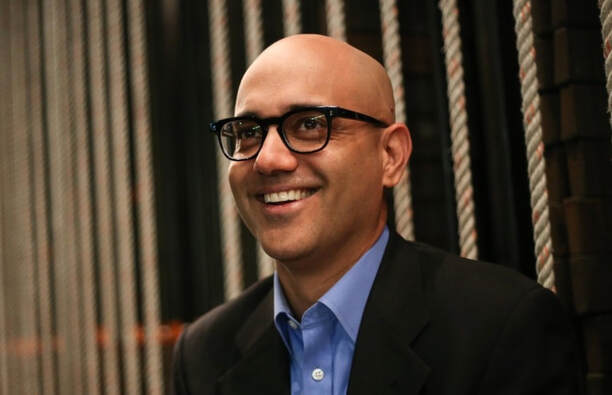|
(photo: Marc J. Franklin for Playbill)
Ayad Akhtar deftly blurs the lines between memoir and literary fiction as he explores what it really means to be American in a post 9-11 era. “Homeland Elegies” is immediate and politically charged, with a tender father and son story at its core. The novel is loosely autobiographical as Ayad, the novel's protagonist, like the actual author, is a playwright of Pakistani descent living in New York. He is constantly confronting family and societal battles -as a Muslim who has often the target of micro-aggressions- and as the son of a Pakistani immigrant. As a successful doctor who successfully provided for his family while practicing in Wisconsin, his father often critiques his son for pursuing creative endeavors instead of lucrative ones. Throughout the novel, Ayad navigates what he considers home. Is it America where he has spent most of his life, or the Pakistan of his youth? He has allegiance to both, but experiences guilt if he is critical of either. As such, he is stuck in between the very different perspectives on the topic by his parents. His mother fondly clings to her homeland, while constantly voicing resentment towards the U.S. Conversely, his father is dismissive of Pakistan, and views America as the “great land of opportunity.” As an adult, Ayad forges his own identity and a new life in New York. His respect for the country he has learned to embrace and his infatuation with his adopted city is tested after Muslims become the target of a disportioncate amount of hate in the aftermath of 9-11. One of the results of Ayad’s conflicting emotions came in the form of a play he wrote that garnered much success on and off Broadway. Not quite ten years after 9/11, I wrote a play in which an American-born character with Muslim origins confesses that as the towers were falling, he felt something unexpected and unwelcome, a sense of pride- a “blush” is how he describes it- which, he explains in the play’s climatic scene, made him realize that, despited being born here, despite the totality of his belief in this country and his commitment to being an American, he somehow still identified with a mentality that saw itself as aggrieved and other, a mind-set he’s spent much of the play despising and for which he continually uses to those on stage, and many in the audience, the term “Muslim.” While America was shaken to its core after 9-11, it was torn at the seams after the financial crash of 2008, followed by the presidential election of 2016. The political divide was never bigger and the racist rhetoric probably hadn’t been more loud and blunt in many decades. The only thing more surprising to Ayad than the actual results of the presidential run-off was his father supporting Trump. Once again, father and son find another issue to be at odds over, and Ayad, the author and protagonist, found endless social commentaries to observe and present. Although finding answers to life’s dilemmas is a goal for Ayad, experiencing healing and closeness with his father priority. America is his homeland, but family is home. That search for connection- to the world and to family- is a trough line of this brilliant novel. It’s the broad social constructs, mixing with the deeply personal layers, along with the poignantly merged genres that make “Homeland Elegies” one of the most important books you should read this year by one of the most interesting writers of our time.
0 Comments
Leave a Reply. |
Archives
January 2024
Categories |

 RSS Feed
RSS Feed